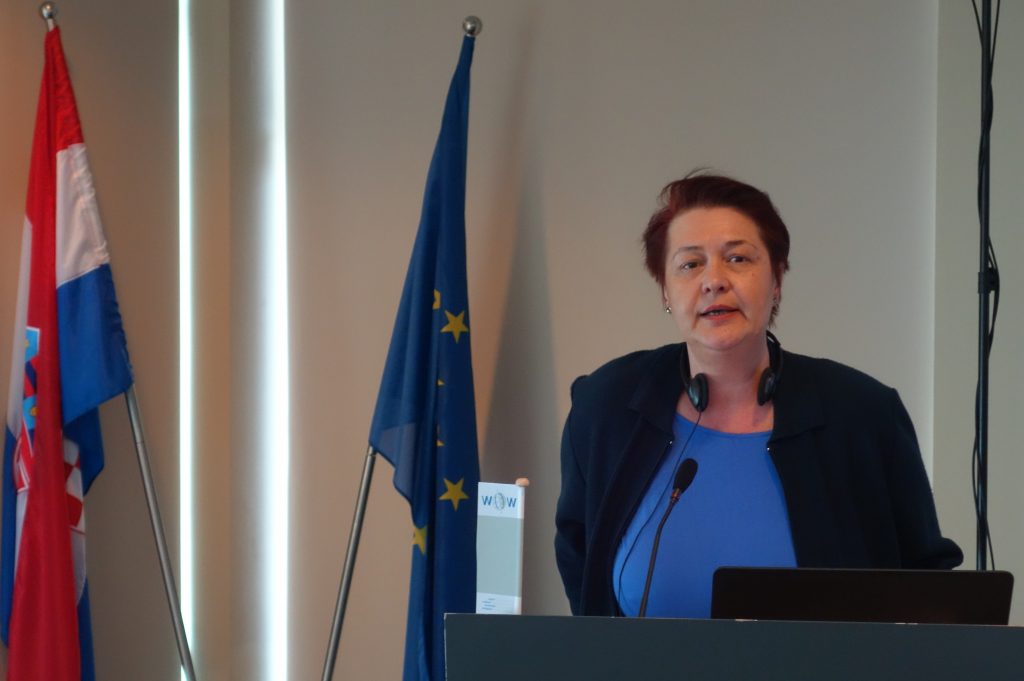From 26 – 28 April 2017 the CNV (Netherlands), the FCG-GPA-djp (Austria) and the World Organization of Workers (WOW) in cooperation with the European Centre for Workers’ Questions (EZA) and supported by the European Commission organized a seminar titled “Cross-border work: the effects of the freedom of movement of workers within the EU”. The seminar took place in Dubrovnik, Croatia and was attended by 52 persons (including experts and technical support) from thirteen EU Member States and Candidate Member States.
The free movement of workers is one of the four freedoms enjoyed by EU citizens. This freedom includes the rights of movement and residence for workers, the rights of entry and residence for family members, and the right to work in another Member State and be treated on an equal footing with nationals of that Member State.
Due to different labour and social rights as well as wage and salary policy the differences in labour-costs in the different countries varies tremendously. Issues of social security, labour law or wage levels are regulated differently in the Member States. The labour market policy, as well as the enforcement power of the trade unions differ from country to country.
The aim of the trade unions in this context is to enforce equal pay at the same place. Transnational corporations play an important role. Fundamental social rights must have priority over the internal market freedoms, because in our understanding Man is at the centre of our activities. We are convinced that an exchange and better networking between the trade unions of each country will lead to a strengthening of the rights of workers in the context of cross-border working.
Speakers from different sides of the spectrum as well as different countries presented their vision and ideas. These speakers were:
1. Video Message – Mr. Othmar Karas, Member of the European Parliament, Member of the Austrian People’s Party, Head of the Austrian EPP Delegation (Austria)
2. Mrs. Prof. Dr. Iris Goldner Lang, Jean Monnet professor of European Union law, Holder of the UNESCO Chair on Free Movement of People, Migration and Inter-Cultural Dialogue at the University of Zagreb, Faculty of Law (Croatia)
3. Mrs. Ariadne Mavronikola, Policy Advisor at the Austrian Trade Union Federation – ÖGB (Austria)
4. Mr. Filip Van Overmeiren, Lawyer & Researcher Department of Criminology, Penal Law and Social Law, Ghent University (Belgium)
5. Mrs. Dr. Maria Škof, Attorney at Law and Partner at Grilc Vouk Škof (Slovenia)
6. Mrs. Hester Houwing, Policy Advisor Labour-Market, CNV (Netherlands)
7. Mr. Mads Peter Klindt, Associate Professor, PhD, Center for Labor Market Research (Carma), Department of Political Science, Aalborg University (Denmark)
The seminar started with a Video Message by Mr. Othmar Karas in which he stressed the importance of cross-border work as one of items which connect the European countries to one common labour market. Within the EU we do not have any restrictions and on the other hand people within the EU have the right and possibility to work or offer services in another EU country. This freedom should, however, not entail a complete deregulation. Abuse of the freedom should be countered and prevented to make the EU project when it comes to freedom of movement a success.
Mrs. Iris Goldner Lang, continued with her part on The Principle of Subsidiarity and the Role of National Parliaments: The Case of Croatia. The competences of the EU and of the Member States are clearly defined. Under the principle of subsidiarity, in areas which do not fall within its exclusive competence, the European Union shall act only if and in so far as the objectives of the proposed action cannot be sufficiently achieved by the Member States. On 8/3/2016 the Commission presented its proposal (COM(2016) 128 final) for a revision of the Posting of Workers Directive 96/71. 14 chambers of national parliaments from 11 MSs sent reasoned opinions claiming the proposal was in breach of subsidiarity principle. The reasons for doing so differed from one country to the other. Croatia was one of the countries against the revision proposed. The two main reasons were:
1. The objective could have been better achieved at MS level
2. Justification with regard to the principles of subsidiarity and proportionality is not detailed enough
According to Ms. Goldner-Lang, the Croatian arguments were not related to subsidiarity, but more out of fear that the competitive advantage would be lost (which was a reason for some other countries to not agree with the proposed revision).
Mrs. Ariadne Mavronikola, spoke of the practice of social dumping in relation to cross-border work. Legislation is not preventing abuse, but rather being used as a business-model. 86% of postings are made in the EU-15, often from low to high wage countries. This is often not in favour of the workers. The principle «equal pay for equal work at the same place» should be put into practice, according to Juncker. The Commission proposes a specific rule: If the posting is envisaged or effectively lasts more than 24 months, the host Member State is deemed to be the country in which the work is habitually carried out. This implies legal certainty and is in line with social security legislation. However, the average posting lasts less than 4 months. This means that legislation does not comply with practice. The EU is currently at a turning point: Do we want a neoliberal or social Europe?
Mr. Filip Van Overmeiren agreed with this lack of effective legislation. There is furthermore a need for more convergence in the concept of posting. There are numerous issues to be tackled such as: unclarities, interpretation problems, lack of information, poor administrative cooperation, very late tackling of main problem of enforcement. There is the rise of a new era for posting of workers: better monitoring and compliance. Furthermore national measures do not always comply with EU law. The area between the Free Movement of Services and social protection of workers remains very sensitive. And social partners have a decisive role to play here.
Mrs. Dr. Maria Škof spoke of the specific Challenges Related to the Freedom to Provide Services between Austria and Slovenia. There is a large community of Slovenes living in Slovenia but working in Austria. Austrian law is not providing enough for these workers and at times even obstructs activities (demanding an extensive amount of documentation) and access to the Austrian market (particularly for small and medium-sized enterprises). Penalization, in case of ‘offenses’ is very high, meaning that for these smaller companies it is very risky. Austria is doing so under the banner of social protection and the prevention of wage and social dumping while in fact this is a means of protecting the national market and its workers.
Mrs. Hester Houwing, stated that the internal market has created economic growth and prosperity, but that it also has downside. A number of jobs are disappearing and competition is unequal. This pressure on employment conditions and social security can lead to Euroscepticism among the people. In the Netherlands there is a lack of registration of posted workers (unlike the Limosa system in Belgium). Furthermore there should be more Social Security Coordination on European level. Control-mechanisms and cross-border exchanges of information between relevant institutions with deadlines for exchanges of information should be in place. In addition there should be better cross border labour inspection with digital European database. All of this should be in place to assure equal pay and combat fraud.
The final speaker, Mr. Mads Peter Klindt, focus on the case of Denmark. Denmark was also against the proposed revision, but for other reasons than most other countries. For Denmark it was not an issue of competitiveness. In Denmark there is a strong tradition for labour market regulation through collective bargaining, thus not through legislation. This tradition formed the backbone of the Danish response to the proposed revision of the Directive concerning the posting of workers, since the European Commission is operating with a new pay concept and indicating that wage levels may become subject to EU law. This is conflicting with the traditions and practise on the Danish labour market, hence the negative response to the proposed revision. This tradition is also causing difficulties on the labour-market. The combination of high wage levels, many job opportunities, a transparent bureacracy, and access to welfare benefits make Denmark an attractive destination for labour migrants within the EU. But due to the labour market model (no minimum wage, lack of control by the labour market authorities) social dumping is widespread.
What can be seen is that there are still numerous obstacles to tackle. In a market with so many countries, systems and traditions concerning labour negotiations it will not be easy to come to a directive which is acceptable to all. But of course not all is bad. While very often there is only talk about the abuses of cross-border work the reality shows that most cross-border activities work very well. But it is clear that for some sectors there is still a lot to be done to prevent abuse of the systems.
for pictures click here





